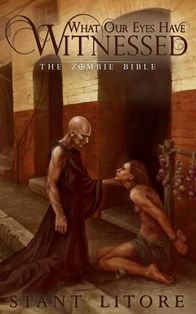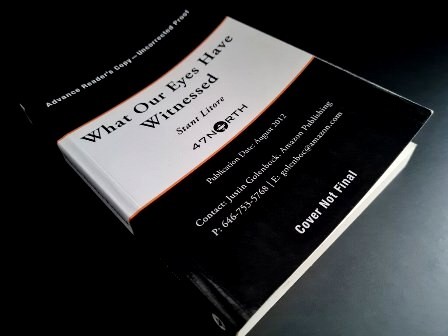

First published in August of 2012, ‘What Our Eyes Have Witnessed’ formed US author Stant Litore’s second instalment into his ‘Zombie Bible’ series. The novel followed on from the author’s previous instalment ‘Death Has Come Up Into Our Windows’ (2012) which incorporated the same idea of injecting a heavy zombie element into a true-to-life historical plot.
DLS Synopsis:
The Roman Empire is at the height of its power. And in the Eternal City of Rome, the rich and wealthy aristocracy live luxurious lives, taking advantage of their status in the dominating class hierarchy. Down from the Palatine Hill, those that live in the Subura slums eke out a very different existence. Nestled alongside the filthy River Tiber, the downtrodden underclass of Rome’s population live in relative poverty; this hardened and desperate segment of Rome living in close-quarters of each other within the congested insulas.
But there is an increasingly worrying threat overshadowing the great city of Rome. For reasons unknown to even the most high-ranking of the citizenship, the dead have returned to life and are hungering for human flesh. As of yet the undead threat has been confined to just the Subura slums, with guards encircling the high ground of the Palatine Hill, protecting those within Rome’s more prestigious class.
However, with the great Emperor away, the senior magistrate of Rome, Caius Lucius Justus - the highest officer of Roman justice, is left with the task of overseeing the ruling of the city. It is a position that has played hard on the Praeror Urbanus’s emotional and physical state. He has spent his life worshipping his forefathers. Those that have died and been buried close by. And now these very same ancestors that his ingrained faith has made so important to him, have returned and are attacking his own people.
Furthermore, Caius’ very own son, Livius, has been bitten by one of the hungering dead, and has since joined their rotting ranks. Tied down within the magistrate’s own sleeping quarters, his dead son is force fed food that is much needed elsewhere.
But thankfully Caius has found himself a scapegoat to blame the blasphemous crime of resurrecting the dead on. The Greek, Father Polycarp, has been preaching his Christian messages and leading in the worship of this outsider’s religion; all within the Subura grounds. His actions have not gone unnoticed by the urban praetor. When his secret worshipping of their Christian god is brought to the attention of Caius by a betrayer to the old father, the senior magistrate takes instant action. The timing is perfect for him to offload the blame of the undead uprising.
Father Polycarp will need to stand trial for his blasphemous crimes against the very core of Roman beliefs. Together with a number of those from his ‘gathering’, the Christian is apprehended and brought to the heart of Rome where he will be questioned and then executed in front of the people of Rome.
However, he has followers who will stand by him until the very end. Believers who have seen the power of the blessed Apostle’s Gift which gives the father the power to free the undead from the shackles of their reanimated lives. One such follower being Regina Rome, who was born Theodora Syriacae from Syria, and was sold as a pleasure slave, but for the past four years had been freed under Polycarp’s selfless care.
But the people of Rome demand blood for what is happening around them. With the moans of the dead heard around the streets of Rome, Caius will hold the trial, which will bring about a merciless vengeance on the one he is proclaiming brought the wrath of the dead to his people. Time is running out for Father Polycarp and his fearful followers. And the dead are already at the door, with a terrible hunger in their clouded dead eyes...
DLS Review:
For his ‘Zombie Bible’ books, author Stant Litore has re-written history, in this case post-Nero Rome, and injected in a hefty zombie element into the telling of this historical past. Here we are back to the Second Century where the Christian bishop of Smyrna, Father Polycarp, is preaching his faith to an underground sect of Christians in the filthy slums of outer-Rome. Like with a zombie-literary-mash-up, the historical story has been corrupted, re-worked and re-written, with the added undead angle bringing in a whole new bearing to the way that the (now entirely fictional) tale pans out.
Litore himself is clearly a well-read and intelligent guy. He’s undoubtedly done the research to make this an incredibly realistic and believable conversion of history. The language, the ingrained caste system, the principals, beliefs and weight on their religion – together as one it paints a thoroughly believable picture of ancient Rome – even with the added zombie element. And with utilising a principal plotline based on actual history, with characters and important historical moments being played out within the tale; Litore has managed to pull together a strangely (and eerily) ‘real’ history with an undead presence.
To say that the novel is well-written is an understatement. Litore proudly declares that he earned his PhD in English, and his academia is definitely evident from the very first page. However, although crammed full of intricate and well-researched details on Rome and life in and around the city during the Second Century, the tale still reads incredibly fluidly, with an uncluttered ease to the storytelling that easily draws the reader in.
Although the tale does initially begin in a disorientating sense of mild confusion, Litore soon flitters back and forth in the sequential timeframe of the tale, until the whole picture is laid out to the reader, just as Polycarp goes to his disgustingly bias trial. Purposefully done, this back-and-forth nature helps to keep the reader guessing at character motivations and the meaning behind certain actions that seem confusing when they first happen, but when the events that led up to them are later explained, it all falls into place with an air of unveiled understanding.
The tale is complex both in its historical accuracies (even with its re-workings) as well as its emotional and spiritual depth. Litore has gone to great lengths to produce a story that is far from Christian preaching, a million miles from a zombie splatter fest, and equally as far removed from a mere literary mash-up. Likewise, Litore has made the emotional investment that is put into the handful of characters the absolute backbone to the storyline. And as such, the zombie element has become more of a background threat, which heightens the pressure and stress of the tale, but is certainly not the overriding factor to the plot.
But do expect bloodshed and some good old fashioned gritty gore. With the dusty backdrop to the tale painted so perfectly, the snowballing undead element gnaws at the reader with a hard-to-ignore harshness that is far nastier than the sum of the descriptive parts. It’s hard-hitting because of the believability that the tale projects.
There’s no easy answer for who the characters are. They are each intricately established and fleshed-out with a particular human honesty that sets the novel way out in front of many of its piers. There’s no denying that the characterisation isn’t anything but absolutely superb. You believe in Regina Rome’s plight. Polycarp is a quietly-spoken wonder upon himself. And Caius Lucius Justus is neither villain nor protagonist. He is as complex and multi-layered as is the tale itself.
It’s a novel that I would recommend to so many different groups of readers. It’s a tale that can be appreciated by many, with a strength and charm that is quite simply hard not to enjoy.
The novel runs for a total of 236 pages.

DLS Synopsis:
The Roman Empire is at the height of its power. And in the Eternal City of Rome, the rich and wealthy aristocracy live luxurious lives, taking advantage of their status in the dominating class hierarchy. Down from the Palatine Hill, those that live in the Subura slums eke out a very different existence. Nestled alongside the filthy River Tiber, the downtrodden underclass of Rome’s population live in relative poverty; this hardened and desperate segment of Rome living in close-quarters of each other within the congested insulas.
But there is an increasingly worrying threat overshadowing the great city of Rome. For reasons unknown to even the most high-ranking of the citizenship, the dead have returned to life and are hungering for human flesh. As of yet the undead threat has been confined to just the Subura slums, with guards encircling the high ground of the Palatine Hill, protecting those within Rome’s more prestigious class.
However, with the great Emperor away, the senior magistrate of Rome, Caius Lucius Justus - the highest officer of Roman justice, is left with the task of overseeing the ruling of the city. It is a position that has played hard on the Praeror Urbanus’s emotional and physical state. He has spent his life worshipping his forefathers. Those that have died and been buried close by. And now these very same ancestors that his ingrained faith has made so important to him, have returned and are attacking his own people.
Furthermore, Caius’ very own son, Livius, has been bitten by one of the hungering dead, and has since joined their rotting ranks. Tied down within the magistrate’s own sleeping quarters, his dead son is force fed food that is much needed elsewhere.
But thankfully Caius has found himself a scapegoat to blame the blasphemous crime of resurrecting the dead on. The Greek, Father Polycarp, has been preaching his Christian messages and leading in the worship of this outsider’s religion; all within the Subura grounds. His actions have not gone unnoticed by the urban praetor. When his secret worshipping of their Christian god is brought to the attention of Caius by a betrayer to the old father, the senior magistrate takes instant action. The timing is perfect for him to offload the blame of the undead uprising.
Father Polycarp will need to stand trial for his blasphemous crimes against the very core of Roman beliefs. Together with a number of those from his ‘gathering’, the Christian is apprehended and brought to the heart of Rome where he will be questioned and then executed in front of the people of Rome.
However, he has followers who will stand by him until the very end. Believers who have seen the power of the blessed Apostle’s Gift which gives the father the power to free the undead from the shackles of their reanimated lives. One such follower being Regina Rome, who was born Theodora Syriacae from Syria, and was sold as a pleasure slave, but for the past four years had been freed under Polycarp’s selfless care.
But the people of Rome demand blood for what is happening around them. With the moans of the dead heard around the streets of Rome, Caius will hold the trial, which will bring about a merciless vengeance on the one he is proclaiming brought the wrath of the dead to his people. Time is running out for Father Polycarp and his fearful followers. And the dead are already at the door, with a terrible hunger in their clouded dead eyes...
DLS Review:
For his ‘Zombie Bible’ books, author Stant Litore has re-written history, in this case post-Nero Rome, and injected in a hefty zombie element into the telling of this historical past. Here we are back to the Second Century where the Christian bishop of Smyrna, Father Polycarp, is preaching his faith to an underground sect of Christians in the filthy slums of outer-Rome. Like with a zombie-literary-mash-up, the historical story has been corrupted, re-worked and re-written, with the added undead angle bringing in a whole new bearing to the way that the (now entirely fictional) tale pans out.
Litore himself is clearly a well-read and intelligent guy. He’s undoubtedly done the research to make this an incredibly realistic and believable conversion of history. The language, the ingrained caste system, the principals, beliefs and weight on their religion – together as one it paints a thoroughly believable picture of ancient Rome – even with the added zombie element. And with utilising a principal plotline based on actual history, with characters and important historical moments being played out within the tale; Litore has managed to pull together a strangely (and eerily) ‘real’ history with an undead presence.
To say that the novel is well-written is an understatement. Litore proudly declares that he earned his PhD in English, and his academia is definitely evident from the very first page. However, although crammed full of intricate and well-researched details on Rome and life in and around the city during the Second Century, the tale still reads incredibly fluidly, with an uncluttered ease to the storytelling that easily draws the reader in.
Although the tale does initially begin in a disorientating sense of mild confusion, Litore soon flitters back and forth in the sequential timeframe of the tale, until the whole picture is laid out to the reader, just as Polycarp goes to his disgustingly bias trial. Purposefully done, this back-and-forth nature helps to keep the reader guessing at character motivations and the meaning behind certain actions that seem confusing when they first happen, but when the events that led up to them are later explained, it all falls into place with an air of unveiled understanding.
The tale is complex both in its historical accuracies (even with its re-workings) as well as its emotional and spiritual depth. Litore has gone to great lengths to produce a story that is far from Christian preaching, a million miles from a zombie splatter fest, and equally as far removed from a mere literary mash-up. Likewise, Litore has made the emotional investment that is put into the handful of characters the absolute backbone to the storyline. And as such, the zombie element has become more of a background threat, which heightens the pressure and stress of the tale, but is certainly not the overriding factor to the plot.
But do expect bloodshed and some good old fashioned gritty gore. With the dusty backdrop to the tale painted so perfectly, the snowballing undead element gnaws at the reader with a hard-to-ignore harshness that is far nastier than the sum of the descriptive parts. It’s hard-hitting because of the believability that the tale projects.
There’s no easy answer for who the characters are. They are each intricately established and fleshed-out with a particular human honesty that sets the novel way out in front of many of its piers. There’s no denying that the characterisation isn’t anything but absolutely superb. You believe in Regina Rome’s plight. Polycarp is a quietly-spoken wonder upon himself. And Caius Lucius Justus is neither villain nor protagonist. He is as complex and multi-layered as is the tale itself.
It’s a novel that I would recommend to so many different groups of readers. It’s a tale that can be appreciated by many, with a strength and charm that is quite simply hard not to enjoy.
The novel runs for a total of 236 pages.

© DLS Reviews








